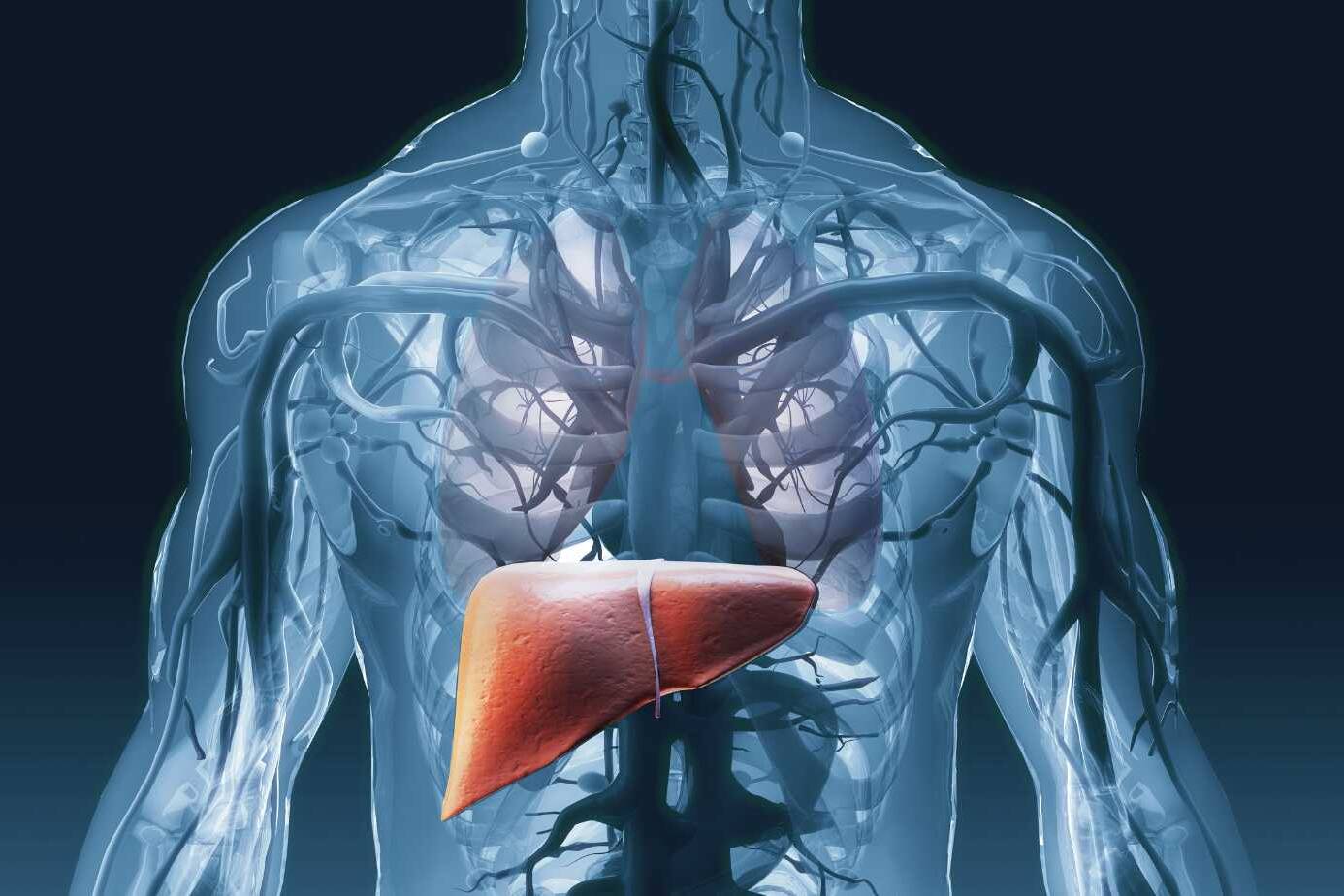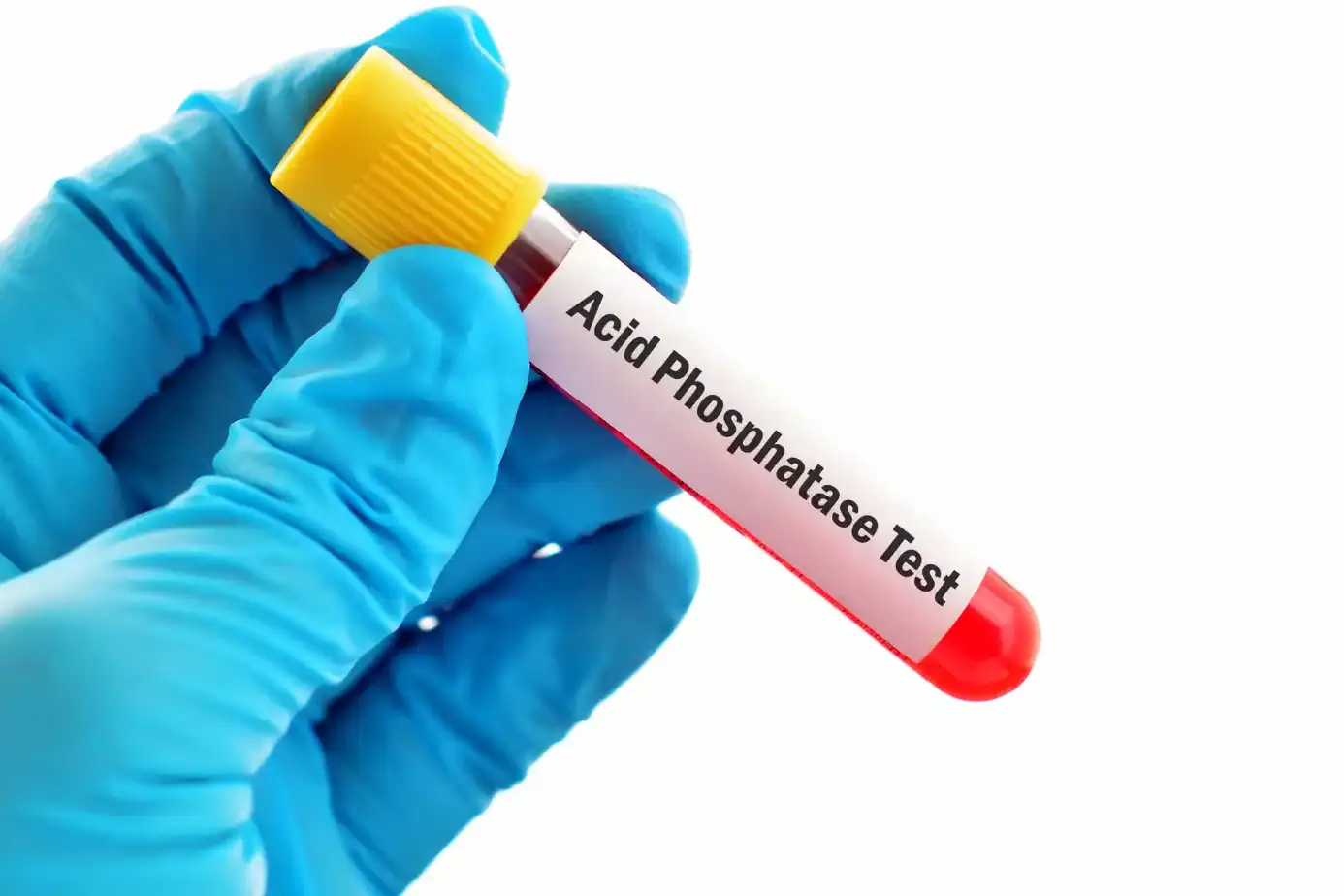Liver cirrhosis is a severe condition that worsens over time. It greatly affects your health and quality of life. Fortunately, there are proven treatments to help. These treatments aim to manage the condition and better your liver’s health.
Table of Contents
ToggleThis article explains how to treat liver cirrhosis. It covers lifestyle changes, diet adjustments, medicines, and even liver transplants. You will learn about the various ways to handle liver cirrhosis. This knowledge will empower you to play an active role in enhancing your health.
Understanding Liver Cirrhosis
Liver cirrhosis is a serious health issue where the liver gradually gets covered in scar tissue. This happens when the liver has been damaged over time. The forming of scar tissue reduces the liver’s function and can lead to many problems. It’s important to know the causes and symptoms of liver cirrhosis to get the right treatment.
What is Liver Cirrhosis?
When the liver becomes severely damaged, it can’t work as it should. The damage leads to the formation of scar tissue. This process disrupts the liver’s normal activities like toxin filtering and protein production. It also affects blood flow regulation.
Causes of Liver Cirrhosis
Chronic hepatitis, lots of alcohol, and certain inherited diseases are main causes. Viruses like hepatitis B and C are also big culprits. Excessive, long-term alcohol consumption damages the liver. This can eventually lead to cirrhosis.
Non-alcoholic fatty liver disease also plays a role. It’s often seen in those with obesity. In some cases, this disease can advance to cirrhosis.
Symptoms of Cirrhosis
Signs of cirrhosis can be very different from person to person. They include being very tired, not feeling hungry, and feeling pain in the stomach. Swelling in the abdomen or legs, and changes in skin color can also occur.
If the disease gets worse, a person might have jaundice. They could also get a lot of fluid in their abdomen (ascites) or develop high blood pressure in the liver veins (portal hypertension).
Lifestyle Changes for Liver Cirrhosis Management
Managing liver cirrhosis starts with big lifestyle changes. Stay away from alcohol and smoking. They can harm your liver even more. A balanced diet and regular exercise are key. They lower stress on the liver and boost health.
Avoiding Alcohol and Smoking
Not drinking alcohol and stopping smoking are huge for handling liver cirrhosis. Both can speed up liver damage. Seek help from doctors or support groups. They can make stopping easier.
Maintaining a Healthy Weight
Being the right weight is very important for liver cirrhosis. Eat a diet full of good nutrients. It helps your liver work better and keeps you healthy. Regular exercise helps keep your muscles strong and gives you energy, which cirrhosis can lower.
Regular Exercise
Exercise is key for liver cirrhosis management. It keeps your muscles strong, boosts your energy, and gives your liver a break. Talk to your doctor about a fitness plan. It should suit your needs and what you can do.
Practicing Good Hygiene
Good hygiene is extra important if you have liver cirrhosis. You’re more likely to get infections. To stay safe, wash your hands often and avoid some foods. Keep yourself clean to reduce infection risks.

Dietary Modifications for Liver Cirrhosis
It’s very important to eat healthy when you have liver cirrhosis. You must adjust your diet to make sure you get all the nutrients you need. A good, balanced diet will help you stay healthy.
Balanced Nutrition
Eat plenty of fruits, vegetables, lean meats, and whole grains. These foods give your body the vitamins and minerals it needs. They also help you stay strong.
Include foods high in protein like beans, nuts, and eggs in your meals. Protein is vital for your muscles and to avoid being undernourished. This is common for people with cirrhosis.
Reducing Salt Intake
Too much salt can cause problems with fluid retention. Stay away from salty foods like processed meat and junk food. Always check food labels and pick items that are low in sodium. Your doctor might suggest water pills to help with fluid issues.
Managing Malnutrition
If you have cirrhosis, you could be at risk of not getting enough nutrients. Malnutrition is a big worry for those with this disease. Create a meal plan with a dietitian or your doctor that is high in calories and protein. This will help keep your muscles strong and ward off problems.
Sometimes, you may need nutritional supplements. These could be a snack before bed or vitamins. They are important for meeting your dietary needs.
Changing your diet can really improve your liver function and health. It can also help prevent further problems caused by liver cirrhosis.
Medications for Liver Cirrhosis Treatment
Medications are key for liver cirrhosis, along with lifestyle changes. They treat causes and complications. Antiviral drugs fight chronic viral hepatitis. This type of hepatitis often leads to cirrhosis. These drugs may slow or reverse liver damage.
Diuretics can reduce the fluid that gathers in the belly, called ascites. They help manage this common cirrhosis symptom. Medicines for portal hypertension are also used. This helps lower blood pressure in the liver’s blood vessels.
Antiviral Medications
For chronic viral hepatitis like B or C, antivirals are crucial. They can stop the virus’s growth. This may slow liver damage and improve function. Treating the cause directly helps prevent more issues.
Diuretics
Ascites can be managed with diuretics. These drugs make the body lose extra fluid, reducing swelling. They prevent breathing problems and lower infection risk by managing ascites.
Medications for Portal Hypertension
Cirrhosis can cause high blood pressure in the portal vein to the liver. Medicines lower this pressure. They help prevent severe complications like varices or bleeding.
The right medications depend on the patient’s history and cirrhosis cause. Working with your doctor is crucial. Together you can find the best treatment plan for your cirrhosis.

Managing Complications of Liver Cirrhosis
Liver cirrhosis can lead to many issues that need special care. It’s important to know how to handle these problems. Doing so helps keep you healthy and enjoy life more.
Treating Ascites
Ascites is when your belly swells with fluid. To help, eat less salt and take water pills. You might also need a doctor to drain the fluid sometimes.
Managing Edema
Edema causes your legs and feet to swell. To feel better, take water pills and cut back on salt. Balancing your fluids helps reduce this swelling.
Addressing Hepatic Encephalopathy
Hepatic encephalopathy makes you confused because of toxins in the brain. Lactulose and rifaximin can improve this. They are drugs known to help your brain work better.
Preventing Bleeding
Cirrhosis can make you more likely to bleed. To stop this, you may get beta blockers or banding. Your doctor could also suggest medicines to help your blood clot.
liver cirrhosis treatment
Dealing with liver cirrhosis requires a variety of methods. The goal is to tackle the main issue, handle symptoms, and avoid or treat complications. The right liver cirrhosis treatment varies based on disease stage and cause. It may involve changes in lifestyle, diet, medications, and sometimes, cirrhosis treatment options like a liver transplant.
The main aim of liver cirrhosis treatment is to slow down its advance. It seeks to improve how patients live and reduce the risk of dangerous side effects. This approach can lead to better lives for those with liver cirrhosis.

People with cirrhosis should stay away from alcohol totally. Even small amounts are not safe. They should also eat less than two grams of salt a day to control swelling. Acetaminophen is okay for some pain, up to two grams daily. But, herbal remedies like milk thistle are not helpful and might harm the liver further.
To protect those with liver cirrhosis from harmful infections, it’s advised they get vaccinated. This includes shots for hepatitis A and B, along with the pneumococcal vaccine and a flu shot yearly. While full reversal of liver damage is rare, staying off alcohol, losing weight (for fatty livers only), and taking antiviral meds for hepatitis C can slow or sometime partially reverse harm.
When all else fails, and the liver disease is severe, liver transplantation could be an option. People with cirrhosis often face malnutrition. So, it’s key for them to eat a well-balanced diet to stay strong and support their liver.
Regular checks for liver cancer, especially HCC, are crucial because cirrhosis ups the risk. This includes ultrasound scans and blood tests every six months. Also, treatments for encephalopathy, like lactulose syrup and possibly rifaximin, are critical to manage this brain issue.
Lifestyle changes are big in managing liver cirrhosis. This includes stopping alcohol and smoking, keeping a healthy weight, and being active. Good hygiene and watching what medications you take are also very important. Diuretics and a low-salt diet help with swelling. Plus, for varices, medicines like beta blockers or banding are needed to prevent bleeding.
In short, treating liver cirrhosis is very personalized, looking at the individual’s specific conditions. By partnering with their healthcare team and staying active in their care, people with cirrhosis can make their lives better. They might also slow down the disease’s progress.
Liver Transplantation
If you have severe liver cirrhosis, a liver transplant might be your best hope. This procedure saves lives by fixing the liver. It lets people live a better life. But getting a new liver involves many steps. You must qualify, wait for a match, and then care for your new organ.
Eligibility Criteria
To see if you can get a new liver, doctors check a few things. They look at how sick your liver is, if you have other health issues, and if you’re strong enough for surgery. They use a score called the MELD score to know how urgently you need a new liver.
Waiting List and Donor Matching
If you pass the checks, you join a waiting list. The time you’ll wait varies. It depends on your MELD score, your blood type, and donor liver availability. Your team looks for a liver that fits you in size, blood type, and tissue match.
Post-Transplant Care
Getting a liver transplant means your care journey is just starting. You’ll need to take special drugs to stop your body from rejecting the new liver. Regular check-ups and lab tests will also be part of your life. This is all to make sure your new liver is working well.
Liver transplants are complex but hope-giving procedures. Working closely with your medical team is key. It increases your chance of a good recovery.
Preventing Liver Cancer
If you have liver cirrhosis, your risk of liver cancer grows. This is especially true for hepatocellular carcinoma (HCC). But, there are ways to lower this risk. Taking action now can really help your health eventually.
Regular Screening
For those with cirrhosis, getting checked often is key. You should have ultrasounds and blood tests every 6 months. This helps find any signs of liver cancer early. And treating it early gives you the best chance.
Early Detection and Treatment
Finding liver cancer early means more treatment choices, like surgery or tumor removal. Ablation or targeted therapies are also options. This quick action could make a big difference in your health. Working closely with your doctor is crucial for spotting and treating any issues.
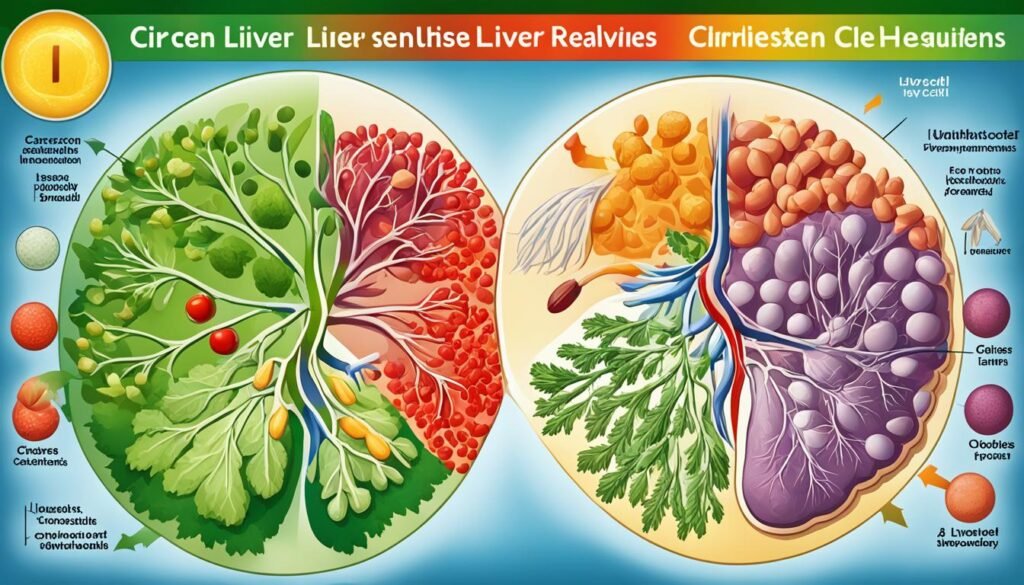
Managing Diabetes with Liver Cirrhosis
If you have liver cirrhosis, you are more likely to get diabetes or see it get worse. This happens because of a problem known as insulin resistance. In this condition, your body doesn’t react well to insulin. So, the control of your blood sugar level becomes tough.
Insulin Resistance
Liver cirrhosis plays a part in insulin resistance. This makes it tough for your body to use insulin well. It means controlling your blood sugar is not easy.
This problem can also cause a higher risk of getting chronic liver disease or other serious liver issues. That’s why staying on top of this with your healthcare team is key.
Monitoring and Medication Adjustments
If you have both diabetes and liver cirrhosis, keeping a close eye on your blood sugar is vital. Your healthcare provider may have to change your diabetes medicines. The liver’s issues can affect how these drugs work.
So, your provider will keep an eye on your medicine’s doses and how well they work. They’re making sure the diabetes and cirrhosis are managed well together.
It’s important to work closely with your healthcare team to manage your diabetes. They might need to change your medicines. This is because your liver may not handle the medicines the same.
But with regular check-ups, changes in medicine, and focusing on staying healthy, you can live well. Paying attention to your health every day makes a big difference.
Vaccinations for Liver Cirrhosis Patients
People with liver cirrhosis face a higher infection risk. Their liver is already weak. Thus, they should get certain vaccines. These include hepatitis A and B, pneumococcal, and flu shots. By staying current with these vaccines, they can lower infection and serious illness chances.
Hepatitis A and B Vaccines
Hepatitis A and B vaccines lower the risk of viral hepatitis in liver cirrhosis patients. Those with chronic liver issues are more at risk for hepatitis A. A study showed that all 225 liver disease patients were protected against Hepatitis A after vaccination. After the Hepatitis B shot, 76% developed strong immunity, proving the vaccines are effective.
Pneumococcal Vaccine
The pneumococcal vaccine helps prevent pneumonia, which is common in liver cirrhosis patients. Research focuses on the importance of vaccinations for those with liver problems. This includes those with chronic hepatitis, liver disease from alcohol, cirrhosis, and those who had liver transplants, strengthening the case for this vaccine.
Influenza Vaccine
Liver cirrhosis patients should get the flu shot. They are more at risk for flu complications. The advice for hepatitis shots also goes for people with cystic fibrosis, with detailed timing suggestions from medical experts.
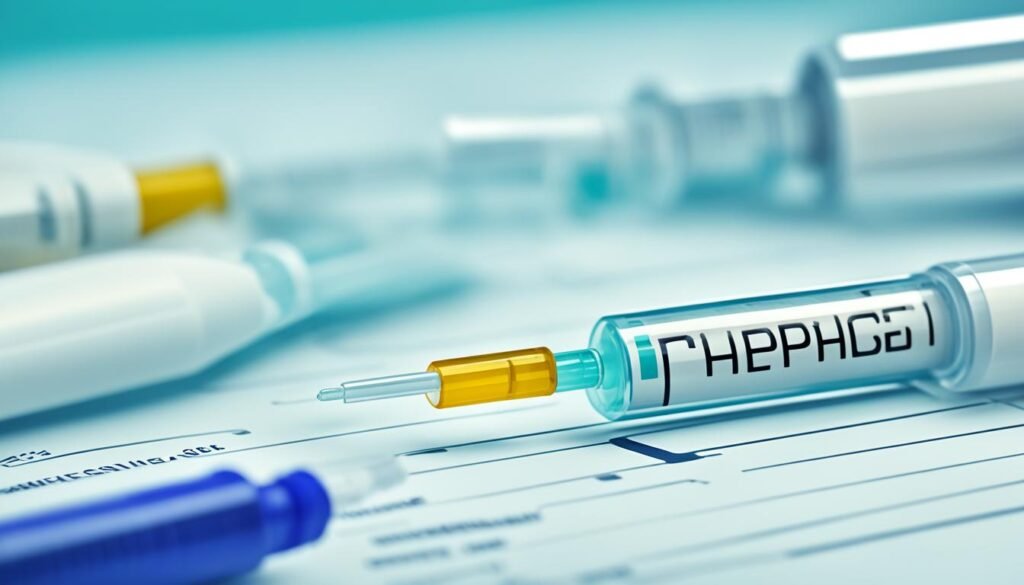
Complementary and Alternative Therapies
Conventional medical treatments are the top choice for managing liver cirrhosis. But, some people look into other therapies too. They use these alongside their regular care. One popular alternative is herbal supplements like milk thistle.
Herbal Supplements
Yet, it’s crucial to realize that herbal supplements might not be so helpful for cirrhosis. It’s true they could even be harmful. They might react badly with other meds or hurt your liver more. Always talk to your doctor before trying out any of these options for your liver cirrhosis.
Patient Education and Support
Managing liver cirrhosis well takes teamwork between you and your healthcare team. Knowing your treatment options and sticking to them is key. It’s vital to share your thoughts and ask questions for a plan that suits you best.
Understanding Treatment Options
Learning about how liver cirrhosis is treated is crucial. Treatments might involve changing your lifestyle, adjusting your diet, taking medications, or even a liver transplant. Each option has its own benefits and limits. Work with your healthcare team to choose what’s best for you.
Communicating with Healthcare Providers
Talking openly with your doctors is essential. Share everything about your health and how you’re feeling. Your doctors need this info to give you the right care. Also, tell them if you find it hard to follow the treatment plan. This honesty helps them adjust your care as needed.
Support Groups and Resources
Dealing with liver cirrhosis can be tough on you, both physically and emotionally. Joining a support group or finding good info online can be helpful. It connects you with others in the same boat. Together you can share tips and learn how to cope better. Look for local groups and trusted websites to learn more and get support.
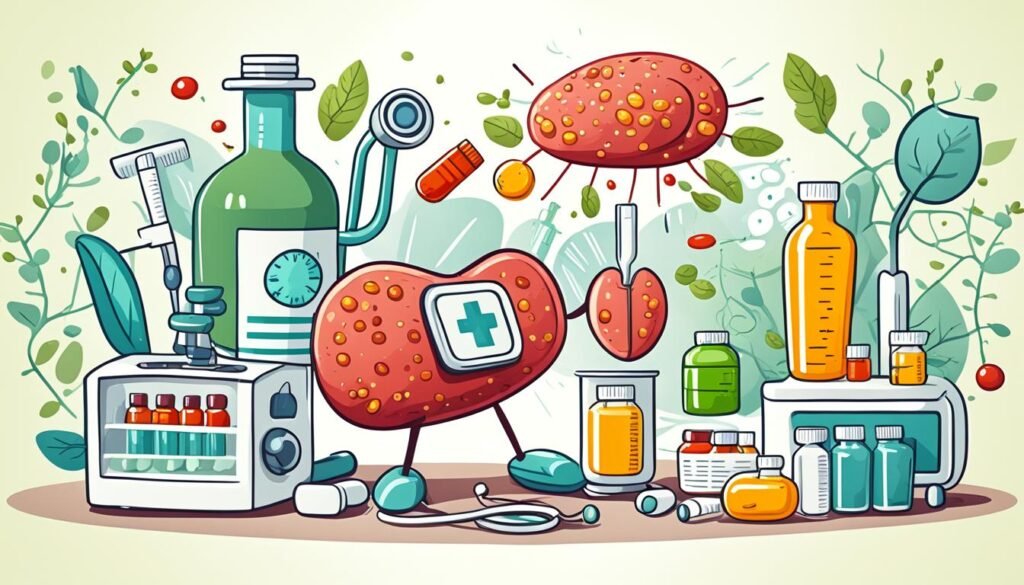
Prognosis and Outlook
The outlook for those with liver cirrhosis depends on many things. This includes what caused it, how far it has progressed, and how well treatment works. Early action and managing the condition can slow or stop its progression. But, as liver cirrhosis advances, the outlook gets more serious, with a higher risk of dangerous complications.
Life expectancy for people with liver cirrhosis can vary. It might be from 2 to 12 years, based on how severe it is and its type. Those with compensated cirrhosis can expect to live 9 to 12 years, but around 5 to 7% might get worse each year. For those with decompensated cirrhosis, life is much harder, with an average of only 2 years if it’s advanced.
The Child-Turcotte-Pugh (CTP) scoring system groups cirrhosis patients into classes A, B, or C. It shows the likelihood of surviving three months. Class A shows a 95.7% chance, Class B 88.8%, and Class C only 59.9%. The Model for End-Stage Liver Disease (MELD) predicts liver cirrhosis life expectancy using scores. The risk of death is 1.9% for scores below 9, spiking to 71.3% for scores above 40.
To have a better outcome with liver cirrhosis, a full treatment plan is key. This plan includes no alcohol, regular check-ups, and healthy lifestyle choices like exercise and a good diet. Managing complications and treating other conditions like malnutrition can also boost the outlook for liver cirrhosis.
Conclusion
Liver cirrhosis is a serious disease that gets worse over time. To treat it, both the patient and their doctor need to work together. Patients can help by making changes in their daily life and following their doctor’s advice closely.
The treatments include changing what you eat, taking medicine, or in severe cases, getting a new liver. It’s very important for the patient to be involved in their own treatment.
By working with their healthcare team, many people with liver cirrhosis can do better and live full lives. Keeping up with the latest news in treating this disease is very important. It can bring new chances and hopes for people with liver cirrhosis. Always remember, teaming up with your healthcare providers is the best way to take care of your liver and look ahead to a brighter future.
FAQ
What is liver cirrhosis?
Liver cirrhosis is a serious condition marked by the liver’s scarring. This scarring is due to the loss of healthy tissue. It affects the liver’s normal functions.
What are the common causes of liver cirrhosis?
Major causes of liver cirrhosis are ongoing hepatitis, too much alcohol, and fatty liver disease. Inherited liver conditions also contribute.
What are the symptoms of liver cirrhosis?
People with cirrhosis may feel tired and lose their appetite. They might also have belly pain and notice their legs or belly swelling. Skin color changes and bruises are other signs.
How can lifestyle changes help manage liver cirrhosis?
A healthy lifestyle can be very beneficial. This means not drinking, avoiding smoke, and keeping a normal weight. It also includes staying active and being clean.
What dietary modifications are important for liver cirrhosis?
Eat a lot of fruits, veggies, and lean meats. Also, cut down on salt. This diet helps the liver and fights malnutrition.
What medications are used to treat liver cirrhosis?
Doctors might give antiviral drugs for certain hepatitis types. Diuretics help with fluid build-up. Other meds treat high blood pressure in the liver.
How are the complications of liver cirrhosis managed?
Problems like swelling and brain issues are tackled with diet, meds, and specific treatments. This mix is used to control bleeding too.
When is liver transplantation considered for liver cirrhosis?
For severe cirrhosis, a liver transplant might be needed. Doctors decide based on disease stage and overall health.
How can liver cancer be prevented in individuals with liver cirrhosis?
Be sure to get regular check-ups for liver cancer. Use ultrasounds and blood tests for early spotting and treatment.
How is diabetes managed in individuals with liver cirrhosis?
It’s critical to watch blood sugar levels. Adjusting diabetes drugs and tackling insulin issues are vital in cirrhosis care.
What vaccinations are recommended for liver cirrhosis patients?
Those with cirrhosis should get shots against hepatitis A and B, pneumonia, and the flu. This guards the liver against more harm.
Can complementary and alternative therapies be used for liver cirrhosis?
Some try herbal supplements, but their benefits aren’t clear. They may even be harmful. Always talk to your doctor before trying them.
What is the importance of patient education and support for liver cirrhosis management?
Knowing your options and communicating with your doctors is key. Being involved in your care and connecting with support improves results.
What is the prognosis and outlook for individuals with liver cirrhosis?
How cirrhosis goes can change, depending on causes, disease stage, and treatment success. Sticking to your plan and regular check-ups are very important for doing as well as possible.
Source Links
- https://www.mayoclinic.org/diseases-conditions/cirrhosis/diagnosis-treatment/drc-20351492
- https://www.niddk.nih.gov/health-information/liver-disease/cirrhosis/treatment
- https://www.nhs.uk/conditions/cirrhosis/treatment/
- https://www.webmd.com/digestive-disorders/understanding-cirrhosis-basic-information
- https://britishlivertrust.org.uk/information-and-support/living-with-a-liver-condition/diet-and-liver-disease/cirrhosis-and-diet/
- https://www.ncbi.nlm.nih.gov/pmc/articles/PMC3127780/
- https://www.ncbi.nlm.nih.gov/pmc/articles/PMC5114497/
- https://www.healthline.com/nutrition/liver-cirrhosis-diet
- https://www.mayoclinic.org/tests-procedures/liver-transplant/about/pac-20384842
- https://transplantsurgery.ucsf.edu/conditions–procedures/cirrhosis.aspx
- https://www.ncbi.nlm.nih.gov/pmc/articles/PMC5070280/
- https://cancerblog.mayoclinic.org/2023/12/13/to-reduce-your-liver-cancer-risk-prevent-liver-disease-and-cirrhosis/
- https://www.cancer.org/cancer/types/liver-cancer/causes-risks-prevention/prevention.html
- https://www.ncbi.nlm.nih.gov/pmc/articles/PMC2653324/
- https://www.uptodate.com/contents/immunizations-for-adults-with-chronic-liver-disease
- https://www.stlukes-stl.com/health-content/medicine/33/000037.htm
- https://www.ncbi.nlm.nih.gov/pmc/articles/PMC3730290/
- https://www.uptodate.com/contents/cirrhosis-beyond-the-basics
- https://www.medicalnewstoday.com/articles/cirrhosis-of-the-liver-life-expectancy
- https://www.ncbi.nlm.nih.gov/pmc/articles/PMC2271178/
About The Author

This article is medically reviewed by Dr. Nivedita Pandey, Senior Gastroenterologist and Hepatologist, ensuring accurate and reliable health information.
Dr. Nivedita Pandey is a U.S.-trained gastroenterologist specializing in pre and post-liver transplant care, as well as managing chronic gastrointestinal disorders. Known for her compassionate and patient-centered approach, Dr. Pandey is dedicated to delivering the highest quality of care to each patient.
→ Book a consultation to discover which remedies suit your needs best.
About Author | Instagram | Linkedin


